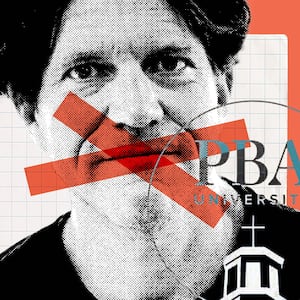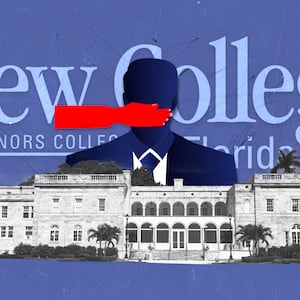In June, Texas A&M University held a public ceremony announcing the hiring of Kathleen McElroy—a veteran journalist, former New York Times editor, and Texas A&M alumnus—as the director of the school’s revived journalism program.
The university celebrated the hire in Texas A&M Today, and in a “recap” of the online reaction to the announcement obtained by The Daily Beast, the university’s social media coordinator wrote that it was “one of the most positively received stories we have shared” during his employment, eliciting “pretty unheard-of levels of positivity for today’s internet.”
But then Texas A&M diluted its initial offer to McElroy, and she decided to return to her former post at the University of Texas. The subsequent public outcry and fallout from the botched offer led to the resignations of university president M. Katherine Banks and interim dean Jose Luis Bermudez.
This week, McElroy reached a $1 million settlement with her alma mater, as per a joint statement published along with hundreds of pages of documents collected for a report by the university’s general counsel. The messages included in the documents, along with those obtained by The Daily Beast via a Texas Public Information Act (PIA) request, help shed light on how the situation at Texas A&M unraveled.
PROBLEMATIC BEFORE DAY ONE ON THE JOB
Concerns about McElroy’s appointment appear to have clouded the process from the start.
Wary of potential backlash to McElroy’s professional background, university administrators sought to confidentially delay the announcement of her appointment until the legislative session had ended. “Bottom line,” interim dean Bermudez wrote to Hart Blanton, the head of the department of communication and journalism, “is the NYT connection is poor optics during this particular legislative session.”
Two days after the ceremony announcing her hiring, a Texas A&M student cast aspersions on McElroy’s credentials in the right-leaning publication, Texas Scorecard. The article, which included a statement from Texas A&M defending the hiring, painted McElroy as a Trojan horse for diversity, equity, and inclusion (DEI) initiatives, running under the sub-headline, “State law will soon ban DEI offices in universities, but state universities can still continue hiring DEI proponents.”
The article was amplified in a bulletin by the Sul Ross Group—a conservative alumni group named for the 19th-century Texas A&M president, former governor, and Confederate Army general—and its contents drew the ire of some members of the Rudder Association, another conservative alumni group, which emerged in reaction to protests against a statue of Ross in 2020.
In a text exchange, Bermudez called the piece a “stupid article.” “It’s a pretend news site,” Hart added, “I don’t know. Like Campus Reform.”
But, of course, outlets like Campus Reform, which are dedicated to churning out sensationalist higher ed “news,” play an essential role in stoking the outrage behind many attempted (and successful) cancellations of left-leaning professors.
In this case, the general counsel’s report notes that the article “generated numerous calls and emails to the President’s Office at TAMU, including from the Rudder Association and other former students, raising questions about why a DEI proponent would be hired to serve as a director of the new journalism program.”
“The Sul Ross Association and Rudder Association are gunning for [McElroy],” Bermudez wrote in one message. “They have no power of course. But people who do have power listen to them.”
Indeed, the report notes that, after the publication of the Texas Scorecard article disseminated by the Sul Ross and Rudder associations, “Banks said that she received calls from 6-7 members of the… Board of Regents asking questions and raising concerns about McElroy’s hiring.”
In a June 16 message to some of his fellow board members, university regent Jay Graham wrote:
“In regards to the info on journalism hire I sent this to John and Kathy [presumably Chancellor John Sharp and President M. Katherine Banks]... Please tell me this isn’t true…. I thought the purpose of us starting a journalism program was to get high-quality Aggie journalist[s] with conservative values into the market. This won’t happen with someone like [McElroy] leading the department.”
In response to such “regent inquiries,” Banks and Bermudez decided that McElroy was not to be granted tenure as originally planned. The two began working to water down McElroy’s contract, and Banks repeatedly mentioned giving Bermudez a bonus for helping to do so.
The administrators walked McElroy’s offer back to a five-year agreement without tenure, then to a one-year agreement—at which point McElroy decided to reject the offer. “I assume all texts were deleted,” Banks texted Bermudez after the arrangement fell through.
Ultimately, the conservative regents’ response to their perception that, as director, McElroy would dash their hopes to make the school’s journalism program a factory for right-wing journalists—and the administration’s craven capitulation to such concerns—provided the stumbling block that sent McElroy’s hiring to a grinding halt.
While the clamor over the McElroy fiasco was still at a fever pitch, with scathing messages on social media pouring in, along with scrutiny from groups such as the Foundation for Individual Rights and Expression (FIRE), news broke of yet another troubling instance of political interference with academic freedom at Texas A&M.
FREE SPEECH, UNLESS IT MAKES THE LIEUTENANT GOVERNOR MAD
In March, the Texas Tribune reported that an assistant professor at Texas A&M, Joy Alonzo, was placed on administrative leave for criticizing Republican Lt. Gov. Dan Patrick during a lecture at the University of Texas Medical Branch on the opioid crisis. The exact substance of the remark remains unclear (yet it seems to have been mundane enough that the Texas Tribune reports “UTMB students interviewed by the Tribune recalled a vague reference to Patrick’s office but nothing specific”).
Texas Land Commissioner Dawn Buckingham—whose daughter was a student in attendance at the lecture—informed the lieutenant governor of Alonzo’s comments, and Patrick later took the matter up with Chancellor Sharp at Texas A&M.
Within hours of the lecture, Sharp had discussed the matter with Patrick, texting him, “Joy Alonzo has been placed on administrative leave pending investigation re firing her. shud [sic] be finished by end of week.” The investigation, however, “could not confirm any wrongdoing,” and Alonzo was ultimately allowed to keep her position.

Lieutenant Governor of Texas Dan Patrick speaks during the Conservative Political Action Conference CPAC held at the Hilton Anatole on July 9, 2021 in Dallas, Texas.
Brandon Bell/GettyResponding to the ensuing controversy, Patrick penned an op-ed in the Houston Chronicle defending his decision to inquire about Alonzo’s remark.
After hearing the rumor of “a false and inappropriate personal attack” against himself, Patrick wrote, he phoned Sharp “to look into the matter.” “Every student, parent, university booster, regent, chancellor, school president or legislator has the right to ask a question about campus conduct,” he argued. “Professors… are not above being held accountable.”
But Patrick’s actions were less a valid inquiry into campus conduct than they were a top-down effort from a public official to leverage political connections and quiet his critics. Under such logic, even a despot persecuting a dissident for lèse-majesté could claim the noble pretense of “accountability.”
If the self-styled campus speech defenders within the right-wing of our nation’s commentariat could be counted on to act with a shred of intellectual honesty, one might expect them to regard the developments out of Texas with the same scrutiny typically reserved for overzealous college activists at small liberal arts colleges.
I won’t hold my breath, though, considering that the stories contradict the fiction that these observers tirelessly peddle: that conservatives are the sole victims of campus cancellations. While that certainly can be the case at times, the back-to-back fiascos described above demonstrate how, in many cases, conservatives enjoy vast influence in higher ed, and they aren’t afraid to abuse it.
While Texas A&M’s administration can, in its defense, brandish their settlement with McElroy and point out that no punishment ultimately came from the investigation Patrick instigated, real progress vis-à-vis academic freedom cannot occur so long as the actors who generated these controversies remain in power.
As Nathan Crick, a Texas A&M journalism professor recently told KAGS-TV about McElroy’s settlement, “as long as those influences are out there that are trying to dictate what this university can be according to a very rigid ideology, then this university will never become the great university that it deserves to be.”










